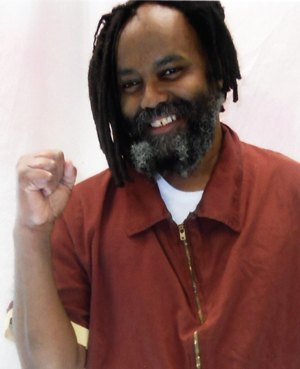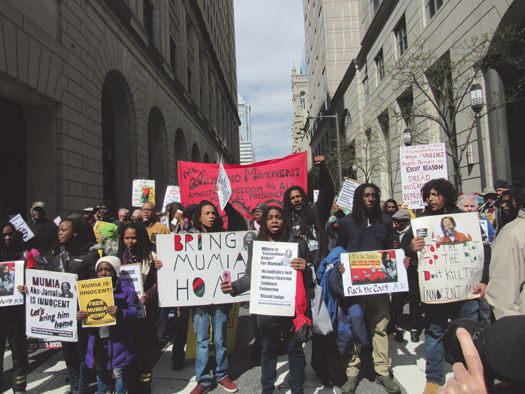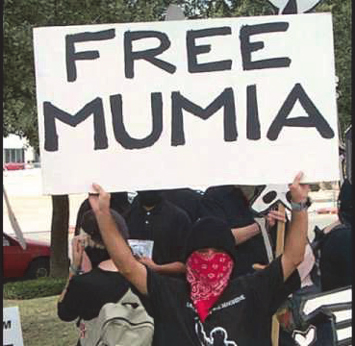Mumia Abu Jamal Relief Hearing Delayed—Again
By Michael Z. Muhammad -Contributing Writer- | Last updated: May 10, 2018 - 4:57:38 PMWhat's your opinion on this article?

Mumia Abu Jamal Photo: Twitter
|
Supporters from as far away as France, who believe Mr. Jamal’s 1982 trial was laden with police lies, prosecutorial and judicial misconduct, were present.
But the hopes of Jamal supporters were dashed as the district attorney’s office claimed to be unable to find critical documents requested by a judge.
The packed hearing held before Judge Leon Tucker, who had ordered the Philadelphia District Attorney’s Office to present new testimony about Ronald Castille. Mr. Abu-Jamal was represented by Judith Ritter, a law professor at Widener University, and Samuel Spital, director of litigation at the NAACP Legal Defense and Educational Fund.
Mr. Castille, a former Pennsylvania Supreme Court judge, refused to disqualify himself when Mr. Jamal’s case came before the high court despite having been the Philadelphia district attorney during prior appeals. Recently the United States Supreme Court ruled such conduct was unconstitutional.
Mr. Jamal was arrested in December 1981 and charged with the shooting death of Philadelphia police officer Daniel Faulkner. According to Pam Africa of the International Family and Friends of Mumia Abu Jamal, Mr. Jamal’s case is riddled with witness coercion and withholding information from the defense.
“At least 15 of the 35 police officers involved in collecting evidence in the case were later found guilty of corruption in other cases,” she charged.

Supporters of Mumia Abu Jamal, imprisoned since 1981 for the murder of White Philadelphia police Officer Daniel Faulkner, gather outside the Criminal Justice Center in Center City, Philadelphia on April 30. Former death-row inmate Mumia Abu Jamal is in court asking a judge to vacate his previous failed appeals attempts, so he can again appeal his case.
|
Ms. Africa further stated that cops and their supporters are worried that the current political climate against police terror and mass incarceration is so strong it could be felt in the courts, where a legal opportunity existed that could result in Mr. Abu Jamal’s release. She cited the release of Philadelphia rapper Meek Mill following pressure and accusations that a judge mishandled his probation.
Johanna Fernandez, a history professor at Baruch College in New York and a consultant on the former Black Panther’s legal team, told The Final Call the district attorney’s office was given ample time to find a critical memo Judge Castille wrote asking for information regarding cases from his assistants. “We know he wrote the memo because we have a response from one of his assistants in which she itemizes a series of cases among them Mumia’s. We need the original memo from Castille because for him to get a release under the Supreme Court case, his attorneys have to prove that Ron Castille had significant involvement in a key decision in the case.”
Ms. Fernandez said prosecutors insisted an exhaustive search was done and the memo was nowhere to be found. “We argued that it is clear the D.A.’s office understands the importance of this memo. So given its importance, Mumia should not be held responsible for the memo’s disappearance,” she said.
The hope is that Judge Tucker finds Mr. Castille was biased and that Mr. Abu-Jamal gets a new case review by a higher state court that results in a new trial.
“We are back in court on Aug. 30, as the judge made no ruling. Judge Tucker some months ago turned to the D.A.’s office and told them it seems this is a case of they’re ‘kicking the can along the road,’ ” said Ms. Fernandez. “What was clear in court was that despite all of the ballyhoos concerning the new district attorney Larry Krasner’s progressive stance, the D.A.’s office is charged with prosecuting, convicting and opposing. So they did their job.”

Demonstrator holds a sign calling for the release of Mumia Abu Jamal.
|
Maureen Faulkner, widow of the slain police officer, published a letter in the Philadelphia Inquirer entitled “Plea to Larry Krasner: Help Keep Mumia Abu-Jamal in Jail.” She wrote, “Thirty-seven years ago Mumia Abu Jamal murdered my husband … . Now, my family and I must stop our lives to attend a hearing where a judge will decide back in the mid-1990’s, if Judge Castille should have had the foresight to see the possibility that the U.S. Supreme Court might make a decision that suggests he should have considered recusing himself from a single case in which he had no significant involvement.” She added, “Like thousands of others in America, my family and I are political prisoners trapped by our legal system.”
Rachel Wolkenstein, former counsel for Mr. Abu Jamal, told The Final Call, Mr. Krasner showed he is just like any other district attorney in Philadelphia. “His deputies came into court posturing there is no evidence in any of the files to show Castile was biased or had a personal interest in prosecuting Mumia’s case,” she said.
For Ms. Wolkenstein and others, the hearing outcome didn’t leave much room for optimism. What is needed, she said, is a protest like the one held the day of the hearing. Suzanne Ross, who represents French supporters of Mr. Abu Jamal and others, called for civil disobedience and massive street demonstrations.
Pam Africa concluded that Mr. Abu Jamal’s freedom would require a combination of actions. “We need to educate people, step up the pressure and bring more people in,” she said.
INSIDE STORIES AND REVIEWS
-
-
About Harriett ... and the Negro Hollywood Road Show
By Rabiah Muhammad, Guest Columnist » Full Story -
Skepticism greets Jay-Z, NFL talk of inspiring change
By Bryan 18X Crawford and Richard B. Muhammad The Final Call Newspaper @TheFinalCall » Full Story -
The painful problem of Black girls and suicide
By Charlene Muhammad -National Correspondent- » Full Story -
Exploitation of Innocence - Report: Perceptions, policies hurting Black girls
By Charlene Muhammad -National Correspondent- » Full Story -
Big Ballin: Big ideas fuel a father’s Big Baller Brand and brash business sense
By Bryan Crawford -Contributing Writer- » Full Story






 Click Here Stay Connected!
Click Here Stay Connected!








